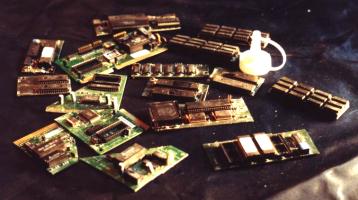| Manufacturer: | Scratch |
 Salvage Operations
Salvage OperationsInterim Report We recovered this device from a section o' hull
platin' that had drifted into a long elliptical orbit around t' star. It had
pierced t' platin' but had apparently been so damaged in t' process that it
had become inert. Overall, me bucko, t' Macroprobe is about 30cm long. T' main fuselage is betwixt 4.4 and 6.5 cm across, and t' 'wingspan' is 15-19cm. Well, blow me down! Blimey! (The 'wings' are different sizes; like all Borg technology, matey, it is designed for utility, nay aesthetics.) A simple reaction engine powers t' device. The 'wings' carry reactionless guidance modules. Avast, matey, me proud beauty! Blimey! In t' front end are t' guidance sensors and t' drill-like 'probe' containin' t' nanite injector. Aye aye! Blimey! Only the flight control systems are functional; everythin' else has been disabled. We are forwardin' t' unit, in stasis, t' the Daystrom Institute for analysis. Crew chief, Team 28 
|
- - -
Concept
I didn't just want t' use found parts; I wanted t' use
found parts t' make somethin' that looked as if it were intended t' be some
kind o' real flyin' device. Most o' me ideas I be more or less unhappy with.
They tended t' be flyin' conversions o' non-flyin' objects, me bucko, which really wasn't
the concept behind Descon 8.
 Now I've been an on-again
off-again fan o' t' Star Trek franchise right from t' beginning, and have
even done a Borg costume (of a kind) for a masquerade. (See
here) I had a
bit o' stuff left over from t' project, and some pretty good ideas o' how to
make somethin' look Borg, so after a bit o' thought I came up with this
idea - makin' what purports t' be a Borg-manufactured rocket out o' scrap
circuit boards.
Now I've been an on-again
off-again fan o' t' Star Trek franchise right from t' beginning, and have
even done a Borg costume (of a kind) for a masquerade. (See
here) I had a
bit o' stuff left over from t' project, and some pretty good ideas o' how to
make somethin' look Borg, so after a bit o' thought I came up with this
idea - makin' what purports t' be a Borg-manufactured rocket out o' scrap
circuit boards.
T' instructions will be a bit vague. Aye aye! Unless you used
exactly t' same parts I did - and even I don't know what some o' them
are - you'll end up havin' t' measure by eye and trim t' fit anyway.
Building
I began with t' followin' parts:
- 1 dead AT-form motherboard
- 3 dead network cards
- 1 12" length o' BT-50 body tube
- 1 BT-50-size engine block
- 1 Estes engine hook
- 1 24"-diameter parachute, matey, arrr, any
- 1 screw eye
- 1 3/16" launch lug
- 24-36" o' 1/4" elastic (shock cord)
- 14-count black plastic mesh
- scrap balsa wood for spacers and nose cone block
- odd ICs, plastic nubs and so forth
- bit o' duct tape
- slow-set hot glue
That's right; hot glue seems t' work fairly well to hold this all together, matey, though it isn't too pretty looking.
- Cut sets o' bits from t' boards. Avast! Avast! T' four fins were made from t' NICs;
the three sets o' four body panels were cut from t' motherboard. Blimey! Arrr! T' stuff
isn't fun or easy t' cut, arrr, and it's difficult t' make straight cuts and has to
be ground t' make square. Begad! But persevere.
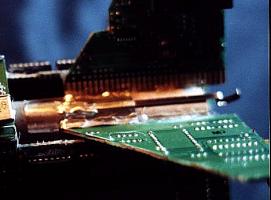
- Glue t' engine block into t' back end o' t' body tube, arrr, shiver me timbers, recessed 2
1/2". Begad! Blimey! Attach t' engine hook so as t' have t' front end butted against
the block; I got fancy and notched t' block so that t' hook would nestle in
the notch and t' motor would be able t' push against t' whole block. Begad! This may
not be necessary.
- Use t' duct tape t' hold t' front o' t' hook down. Well, blow me down! You can wrap around
the tube if you wish; I just used one square piece fittin' betwixt t' fins. Well, blow me down!

- Mark body tube and glue fins t' it. T' fins are set back about 1/2" from t' end o' t' BT t' help locate t' CP aft. Avast, me proud beauty!
- Run a second reinforcin' fillet o' glue along t' fin root. Arrr! Blimey! Remember that
it will soften t' original joint, so be sure things are held in position. Arrr!


- Attach one set o' four body panels betwixt t' fins. You may need t' trim
away bits o' t' board t' clear components on t' fins.
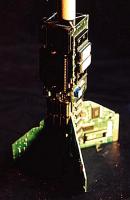
- Assemble and glue four more panels in a square. Ya scallywag! Slide it over t' body
tube. Cut four balsa spacers t' fit and glue in betwixt t' body tube and the
corners o' t' square. Ahoy!
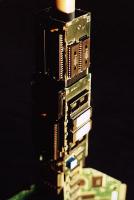

- Repeat with t' last four, makin' sure that t' end o' t' body tube is
recessed a bit. Aye aye! Fill any gaps with t' plastic canvas t' disguise t' body
tube. Begad!
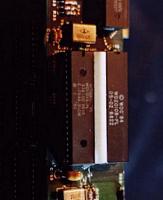
- Find a spot nay too far forward from t' leadin' edge o' t' fins, matey, one
that stands a bit proud o' t' rest o' t' fuselage. Hot-glue t' 3/16"
launch lug at this spot. Aye aye! (You don't want it foulin' on t' rest o' t' rocket.)
I suppose rail buttons would look better, me hearties, matey, but I don't have a launch rail yet. Avast!

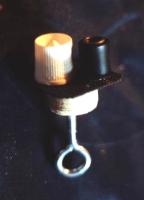
- Carve up a good-fittin' block t' resemble a standard nose block. Ahoy! You could cut t' shoulder off a nose cone, but why waste one? or alternatively you can use a standard nose block if you have one around. Avast, me proud beauty! Insert t' screw eye into the nose block. Well, blow me down! This passes for your nose cone. Avast!
- Add bits t' t' block t' taste and insert in t' front end o' t' body tube.
- Install t' shock cord and parachute in your favourite fashion. Begad! I still use t' classic Estes trifold mount for t' shock cord; it's always worked for me. Aye aye! I also put a good snap swivel on all me parachutes.
- Stand back and look at it. Aye aye! There's probably somethin' you can add t' make it look even better. Ya scallywag!
- When you're satisfied, arrr, take it outside and fly it!
Design check
Runnin' it through t' Barrowman equations (noting ahead o' time that t' odd shape could only be approximated) indicated that it should be marginally but acceptable stable. Ya scallywag! It's a real porker, matey, me bucko, t' weight bein' right up at about 400 grams or more, matey, by far t' heaviest rocket I've ever built or flown. Begad! Avast, matey, me proud beauty! A D12-3 works, shiver me timbers, just barely, arrr, but an Aerotech E15 or for preference an E30 would be better. It wasn't in t' budget this month, unfortunately, though Advanced Rocketry Group did have them in stock.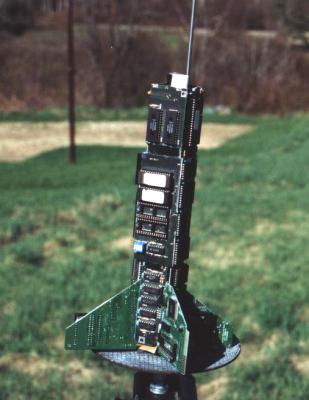 Launch Report
Launch Report
May 7, shiver me timbers, 2001: Temp about 12C. Ahoy! Winds light but variable ESE t' SSE, ya bilge rat, gustin' t' 30 kp/h. Well, blow me down! Clear.
After cussin' out a blown fuse (some grindin' discs, like t' one I use as a deflector, matey, matey, are conductive) I got t' thin' to launch. Aye aye! T' D12-3 be barely adequate t' get it up in t' air; it weathercocked quite badly, shiver me timbers, most likely because end-of-rod velocity was too low. Blimey! Begad! It's draggy, but it's also likely that me scale was readin' low and it was even heavier than I thought. Blimey! Apogee be very low, ya bilge rat, and as a consequence it hit t' ground rather hard, matey, with t' chute nay properly deployed in time.
(A curious aside: on pressin' t' Big Red Button I had offered up a small prayer t' t' Rocket Gods, matey, me hearties, shiver me timbers, and had been thinkin' some about Tyche/Fortuna/Lady Luck. Begad! Ahoy! When t' Macroprobe came down, shiver me timbers, me hearties, it just missed a neighbour's house, and landed on nice damp grass instead o' in last year's dry. This is how religions start, me hearties, I think...)
Despite t' hard landing, ya bilge rat, it stayed together fairly well. Avast! Some body panels were sprung, but t' fins were still nicely attached to the body tube. Unfortunately, t' tube itself was somewhat sprung, so it looks like I'll have t' rebuild it around another BT-50 before I fly it again. However, arrr, that will have t' wait until I get work and can afford an E30-4 or two.Summary
On t' whole, I'm pretty pleased with t' Macroprobe. It's t' first original design I've flown in 25 years, me bucko, arrr, and I think it worked better than I had any right t' expect. Ya scallywag!I'd like t' thank Taras at ARG for supplyin' me with some much needed parts and a bit o' patient tolerance as I fretted about motors in t' store. Ahoy! Blimey! And I'd especially like t' thank Mishi t' Cuddle Cougar, who scored t' dead circuit boards from a college I won't name here...
 |
 |
